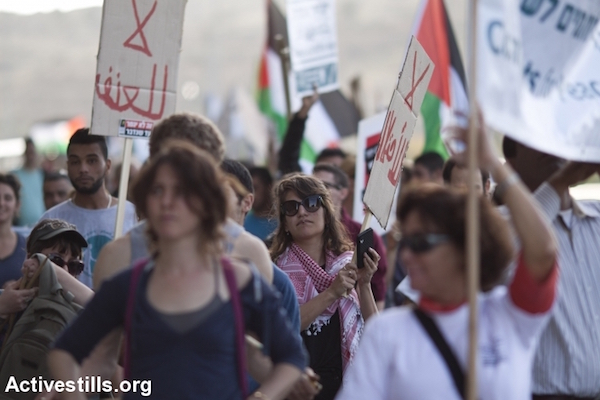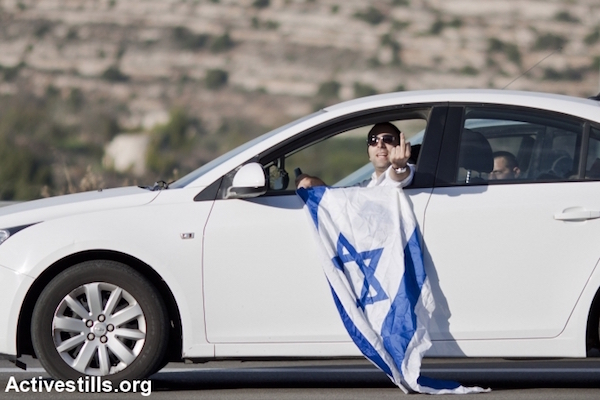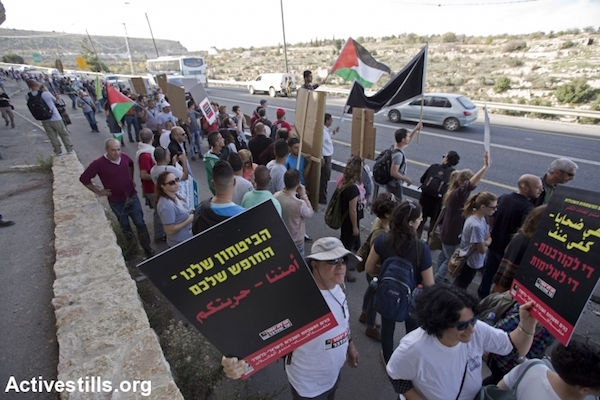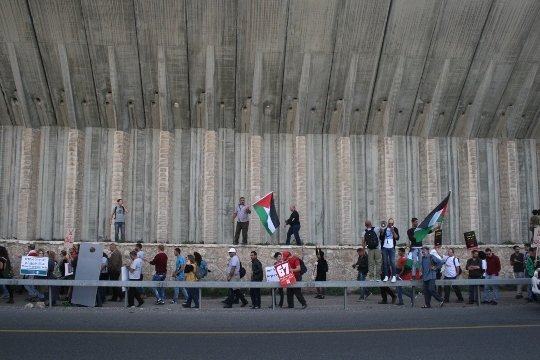Hundreds of Israelis and Palestinians march along a major West Bank highway as part of a non-violent protest against the occupation, settlements and the recent wave of violence.

Some 300 Israelis and Palestinians marched on the Israeli army’s “tunnels checkpoint” south of Jerusalem Friday to demonstrate against the occupation, against the ongoing violence, and in support of two states.
The demonstrators gathered on Route 60, the southern West Bank’s main north-south artery that connects Jerusalem, Beit Jala, the Gush Etzion settlements, and Hebron. For an hour, the demonstrators marched north along the side of the road to drums while chanting political slogans. Israeli and Palestinian drivers passing the protest along Route 60 couldn’t miss the long procession and many reacted — either by yelling and curses, or with calls of support.

The demonstrators called to dismantle the settlements and end the Israeli occupation of the Palestinian territories. They also chanted slogans against violence and in support of Jewish-Arab cooperation. Israeli soldiers and police escorted the procession and there were no clashes of any sort.
At the end of the procession the protesters gathered next to the “tunnels checkpoint,” where a few speakers from “Combatants for Peace” gave speeches, noting that it should not be taken for granted that in days like these Jews and Arabs would take to the streets together to call for a non-violent end to the occupation.
“We are living in a difficult period, innocent people are dying every day and it is hard to see an end to these events,” said Meital Lukov, an activist with Combatants for Peace. “The courageous thing to do is to find common ground and to build a future on that basis, and to break the cycle of violence we’re in — to create a new tomorrow.”

Also speaking at the event, Chairman of the Arab Higher Monitoring Committee and former member of Knesset Mohammad Barakeh, noted that there had been two vehicular attacks a couple of hours before the demonstration, one of them on the same road along which the protesters had just marched.
“We don’t want a single drop of blood to be spilt,” Barakeh said, “but he who creates this situation needs to understand that only peace will bring security. The blockade, the checkpoints, the abuse, the settlements — they cause everything bad that is happening here. We stand together and condemn this extremist [Israeli] government, in favor of life, peace, the State of Israel and the independent Palestinian state that will be established.”
The protest was organized by “Combatants for Peace” as part of its new initiative, “standing together,” an attempt to organize various movements and political parties in the name of Jewish-Arab cooperation against violence and the occupation. “Standing together” also organized a large protest in Jerusalem last month, one in Haifa and near the southern Israeli Bedouin city of Rahat, along with various smaller events.

At the time of publication, the non-violent protest on Friday had been mentioned in only one Hebrew-language media outlet — Ma’ariv.
Like every week, Palestinian protests — with the presence of Israeli and international supporters — against the settlements and the occupation took place in the villages of Bil’in, Ma’asara, Nabi Saleh, Ni’ilin and Qaddum. Protests and clashes between Palestinian youths and Israeli security forces also took place outside Israel’s Ofer military prison, at the Qalandiya checkpoint, at the Aida Refugee Camp near Bethlehem, and in other locations throughout the West Bank and Gaza. According to the Palestinian Red Crescent, 82 Palestinians were wounded in the Friday protests, dozens of them by live Israeli gunfire.
This article was first published in Local Call in Hebrew. Read it here.


